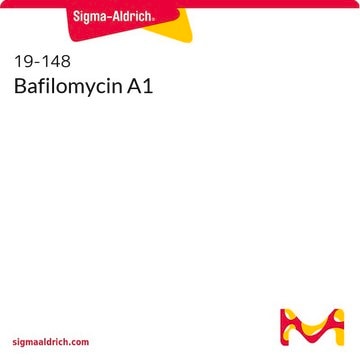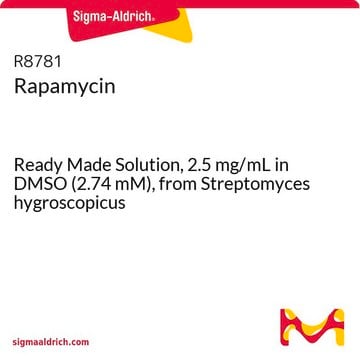B1793
Bafilomycin A1
from Streptomyces griseus, ≥90% (HPLC), film, V-ATPase inhibitor
About This Item
Recommended Products
product name
Bafilomycin A1 from Streptomyces griseus, ≥90% (HPLC)
Quality Level
Assay
≥90% (HPLC)
form
film
antibiotic activity spectrum
fungi
Mode of action
DNA synthesis | interferes
enzyme | inhibits
storage temp.
−20°C
SMILES string
CO[C@H]1\C=C\C=C(C)\C[C@H](C)[C@H](O)[C@H](C)\C=C(C)\C=C(OC)C(=O)OC1[C@@H](C)[C@@H](O)[C@H](C)[C@@]2(O)C[C@@H](O)[C@H](C)[C@H](O2)C(C)C
InChI
1S/C35H58O9/c1-19(2)32-24(7)27(36)18-35(40,44-32)26(9)31(38)25(8)33-28(41-10)14-12-13-20(3)15-22(5)30(37)23(6)16-21(4)17-29(42-11)34(39)43-33/h12-14,16-17,19,22-28,30-33,36-38,40H,15,18H2,1-11H3/b14-12+,20-13+,21-16+,29-17-/t22-,23+,24-,25-,26-,27+,28-,30-,31+,32+,33+,35+/m0/s1
InChI key
XDHNQDDQEHDUTM-JQWOJBOSSA-N
Looking for similar products? Visit Product Comparison Guide
General description
Application
- as an autophagy inhibitor to study its effects on hepatic steatosis in human hepatocytes
- as a vacuolar-type H+ -ATPase inhibitor to study its effects on the cell viability, percentage of PI-positive cells, and glucose-stimulated insulin secretion (GSIS) in mice INS-1 cells
- as a vacuolar-type H+ -ATPase inhibitor to study its effects on tau degradation in human SH-SY5Y cells
Biochem/physiol Actions
Storage Class Code
11 - Combustible Solids
WGK
WGK 3
Personal Protective Equipment
Certificates of Analysis (COA)
Search for Certificates of Analysis (COA) by entering the products Lot/Batch Number. Lot and Batch Numbers can be found on a product’s label following the words ‘Lot’ or ‘Batch’.
Already Own This Product?
Find documentation for the products that you have recently purchased in the Document Library.
Customers Also Viewed
Articles
We presents an article on Autophagy in Cancer Promotes Therapeutic Resistance
Our team of scientists has experience in all areas of research including Life Science, Material Science, Chemical Synthesis, Chromatography, Analytical and many others.
Contact Technical Service













